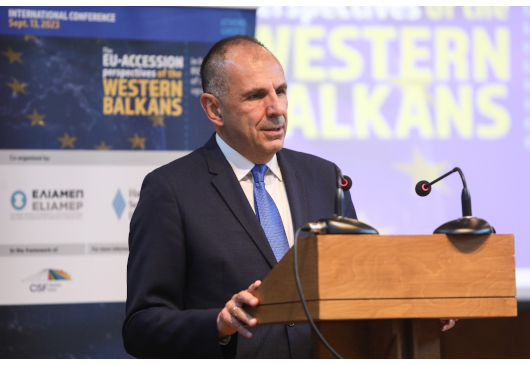 I would like to warmly thank the host ELIAMEP, the think tanks Wilfried Martens Centre for European Studies and Hanns Seidel Stiftung for their kind invitation and cordial welcome.
I would like to warmly thank the host ELIAMEP, the think tanks Wilfried Martens Centre for European Studies and Hanns Seidel Stiftung for their kind invitation and cordial welcome.
Unfortunately, I will have to leave soon after my conclusion, because I will have to host at the Ministry the Minister of Foreign Affairs of Luxembourg, an emblematic figure of European politics.
It is an invitation I accepted with great pleasure.
Not only because the European perspective of the Western Balkans is an issue of paramount importance to Greek foreign policy.
But also, because I believe that vital political steps like this should be the product of reasonable discussion among politicians, the academic community and civil society.
Twenty years ago, in June 2003, Greece took the lead by adopting the Thessaloniki Agenda, which explicitly stated that "the future of the Western Balkans lies within the EU".
And we did so under very complex circumstances.
At that time, the “Balkans” were associated with armed conflicts and ethnic clashes, political instability and economic hardship. It had yet to live down its pre-WWI sobriquet, “the powder keg of Europe.” We have to transform this perception.
Nevertheless, since 2003 Greece has consistently and tangibly supported the European integration of the Western Balkans, including in the context of the current enlargement debate with our EU partners.
At the same time, we are witnessing the rise of new global economic powers in Asia, Africa and the Middle East.
Malicious destabilizing actors are exploiting this disruption and the region’s chronic problems to increase their influence in the Balkans, while the Russian invasion of Ukraine has shaped a new geopolitical reality that we need to address.
This brings a new urgency to the need to fulfil the promise of the Thessaloniki Agenda.
In these challenging times, a strong, resilient and inclusive EU, aiming at its strategic autonomy, is the cornerstone of peace and prosperity for its citizens.
In other words, we need a revitalized enlargement process designed to integrate the Western Balkans – and Ukraine and Moldova – into the EU.
A credible process with bold and ambitious objectives.
And this was the main message of the Athens Summit Declaration on August 21st, when the Greek Prime Minister brought together leaders of Western Balkans, Ukraine and Moldova to meet with the Presidents of the European Commission and the European Council in order to promote the region’s European perspective.
Naturally, we cannot admit candidate countries that do not meet the membership criteria and mainly the core principles of the European edifice such as, especially, democracy and the Rule of Law.
Admittedly, there are instances where attitudes and practices suggest that these principles have yet to be embraced by all candidate countries.
The duly elected Mayor of Himare, Fredi Beleri, is a case in point, as you probably know.
Albania needs to demonstrate that it respects the rights of the Greek National Minority and the rule of law.
This conference is taking place at a pivotal moment.
In the coming time, EU enlargement will top the agendas at EU institutions.
Greece’s clear position will bring the spirit of the Thessaloniki Agenda to this debate.
We will take initiatives and endorse any idea or proposal aimed at revitalizing the enlargement process, making it more concrete, consistent and reliable, while also ensuring sincere cooperation from all parties and a clear timeline for accession.
We will also continue to promote initiatives that improve citizens’ daily lives and bring regional societies and economies closer to the EU.
This is why we are committed to enhancing connectivity both within the Balkan countries and between the Balkans and the EU, focusing on three sectors: telecommunications, transportation and infrastructure.
Another key area is energy security. A vital point for European future.
Key projects Greece has undertaken include the floating storage regasification unit in Alexandroupoli and the Greece-Bulgaria and Greece-North Macedonia gas interconnectors, which reduce regional and European dependence on Russian natural gas.
Regional collaboration is also vital on environmental protection and responding to the climate crisis. On this occasion, I would like to express our deep gratitude to all our partners and neighbours who assisted us with the extreme wildfires we encountered this past summer.
Dear friends,
As the oldest EU member state in the region, it is our duty to guide the Western Balkans on their path to European integration – to the great European family.
The safest and surest path to peace, stability and prosperity that are in the best interest of our countries, of the region and of the European Union altogether.
With these thoughts in mind, I wish you every success in your conference and hope everything goes well for our countries, for our continents, for our world.
Thank you so much.
September 13, 2023


